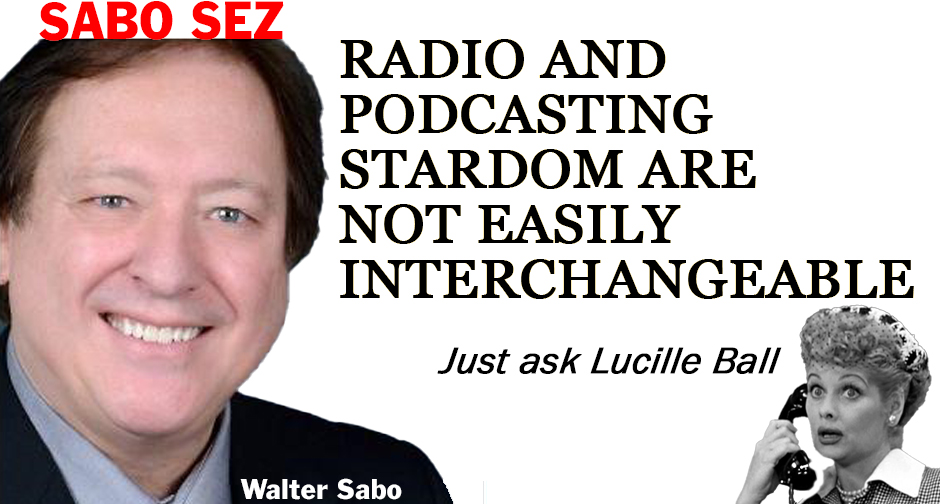By Walter Sabo
Host/Producer, Sterling on Sunday
Media Consultant
Lucille Ball earned 50 shares with her classic TV series, “I Love Lucy.” Every year during her summer hiatus she would make a movie. Name a Lucille Ball movie.
Lucy was the all-time star of television but couldn’t open a movie. Each medium creates its own stars and rarely does a star transfer from one medium to another.
Some examples: “NYPD Blue” first season star David Caruso couldn’t wait to break out from TV and become a movie star. He recently retired from 10 years of work on the TV show “CSI Miami.” Exceptions? Maybe three: Michael J Fox, Will Smith, Steve McQueen.
The phenomenon of single medium stardom is true throughout all crafts. Great magazine writers struggle to turn in a publishable book. Book authors are challenged to condense their thoughts to 1,000 words. Megyn Kelly is a cable star but couldn’t cross the golden bridge to broadcast TV.
Every year a local TV weather person bugs the local talk station to fill-in on a talk show over a holiday. How does it go? Beware the fifth minute. After five minutes all of the passionate feelings the TV talent has about their pet topic have been expressed. With two hours and 55 minutes to go, the local weatherman is in trouble hosting an unscripted radio show. Where is the prompter? Where are the phone calls? But put a radio morning host on TV and the results are just as awful. The radio host looks fat because they have no idea how to dress for TV, they don’t understand the cue lights on the cameras and the prompter is confusing.
Which brings us to the relationship between radio and podcasting
One of the burdensome falsehoods of the moment is that radio talent should be churning out original content podcasts. It’s just audio right? Radio is good at talking! Podcasting has fostered its own stable of stars including Joe Rogan, Adam Carolla, Anna Farris and Ben Shapiro (I know he’s a radio guy, but he’s a better podcaster). To a listener, the production styles of a podcast and live radio are strikingly similar, but you know that the production environments are completely different. Talent who intuitively understand on-demand audience preferences thrive hosting commercial-free podcasts. Radio talent excel within the disposable, often-interrupted flow of a live broadcast. Podcasts allow for thinking time, pausing, editing, correcting and fancy production beds. Live radio? You just better get to the next thing. The mindset of a podcast star versus a radio star must of necessity be appropriate to their unique performance stage.
Most radio managers have met with resistance when asking their talent to make original content podcasts. (Not air checks.) Radio talent is right to resist! Creating a very good radio show is demanding and often exhausting. After three or more hours on the air, no performer has the energy to hop into a production chair and attract a million downloads. Tragically mandatory podcast dictates leave little opportunity for talent to say, “I can’t do a podcast well. I’m a radio performer and isn’t that what you hired me for?” My goodness – such a radio talent would be labelled insubordinate, not a team player, and not part of the future!!!
To be productive and on-brand podcasts offered by a radio station should be hosted by podcast stars. The odds of a radio star creating a winning podcast are about the same as finding a Lucille Ball hit movie.
Walter Sabo is a long-time radio industry consultant and thought leader. He hosts and produces a network radio show titled “Sterling on Sunday” 10:00 pm-1:00 am ET. www.waltersterlingshow.com. walter@sabomedia.com
Share this with your network



 It’s tough enough for radio talent to navigate stable careers in these days of consolidated station ownership, personnel cutbacks and drastic salary reductions – but the NAB’s newly stated stance on non-competes adds insult to injury and is out of step with the interests of beleaguered professionals still hanging on for dear life in the programming sector of this industry. I understand that the National Association of Broadcasters is at heart a lobbying group representing the interests of the medium’s ownership but, c’mon – non-competes really are of another era and egregiously unfair.
It’s tough enough for radio talent to navigate stable careers in these days of consolidated station ownership, personnel cutbacks and drastic salary reductions – but the NAB’s newly stated stance on non-competes adds insult to injury and is out of step with the interests of beleaguered professionals still hanging on for dear life in the programming sector of this industry. I understand that the National Association of Broadcasters is at heart a lobbying group representing the interests of the medium’s ownership but, c’mon – non-competes really are of another era and egregiously unfair.